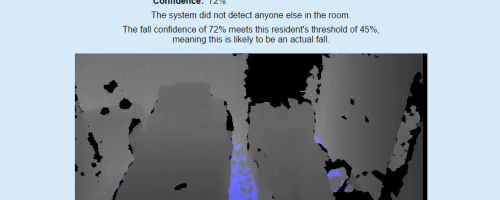Prinicpal Investigator: Skubic
Co-Investigators: George Demiris, Harry Tyrer, Jim Keller, Marilyn Rantz, Myra AudAgency: NSF
Project Summary
MOTIVATION
Americans are living longer and more fulfilled lives, and they desire to live as independently as possible. But independent lifestyles come with risks. To address these issues, researchers are developing “smart home” technologies to help older adults remain independent at home while controlling costs. Smart homes enhance residents’ safety and monitor health conditions using sensors and other devices. Such technology can help keep older adults independent while controlling costs.
We have proposed a model of decline in older adults in which mobility and cognitive impairments lead to functional decline, thereby reducing independence. Appropriate interventions, if offered in a timely manner, can improve functional ability. The key is early identification of changing conditions that indicate impairments.
PROPOSED RESEARCH
We propose to establish a partnership among faculty, students, and researchers at the University of Missouri-Columbia (MU) in the College of Engineering, the Sinclair School of Nursing, and the Department of Health and Medical Informatics, as well as the Medical Automation Research Center (MARC) at the University of Virginia, to develop and evaluate intervention technology for elders. We will utilize a unique eldercare facility in Columbia, MO, called TigerPlace, to study technology targeting mobility and cognitive impairments. Project objectives include:
- Establish a diverse, multidisciplinary team of faculty, researchers, and students to address problems of mobility and cognitive impairment in elders.
- Develop an integrated monitoring system that reliably captures data about the elder residents and their environment in a noninvasive manner and balances the needs of health safety and privacy.
- Collect data in typical independent living, elder settings, using the integrated monitoring system.
- Develop algorithms to extract patterns of activity from the collected sensor data.
- Evaluate the usability of the technology and investigate fundamental issues in human-computer interaction for the population of older adults.
Three main technology components will be investigated: (1) A monitoring system developed by MARC and incorporating gait, physiological, and environmental sensors will be extended. (2) An event-driven video sensor network will be developed, generating an anonymized video stream that hides identifying features of the residents, (3) Sensor and video data will be fused and processed for identifying patterns of behavioral activity. Fundamental human-computer interaction (HCI) issues as related to elders will be investigated. Deliberative evaluation and usability studies will be conducted.
MERIT AND IMPACT
The proposed 4-year project will advance the state of the art in: (1) HCI for elders, (2) Anonymized and compressed video, (3) Extracting human motion and behaviors from video data, (4) Extracting human activity from sensory events, and (5) Fusing sensor and video data for identifying behavioral patterns.
The project will train both graduate and undergraduate students and help establish an infrastructure in conducting future research projects. We have a history of recruiting women and underrepresented minorities that we will continue with this research project. Faculty and administrators from Lincoln University in Jefferson City, MO will assist us in recruiting traditionally underrepresented nursing and CIS students for multi-disciplinary teams and summer internships.
The project will also provide broad impacts by offering a model for eldercare technology and by providing policy makers with answers to complex questions of cost effectiveness and outcomes to help guide decisions about services for older people, such as those funded by Medicare and Medicaid. Thus, the project will strengthen a significant and expanding portion of our civil society. In 2000, 12.4% of the US population was over 65. The projection for 2030 is 20%.

